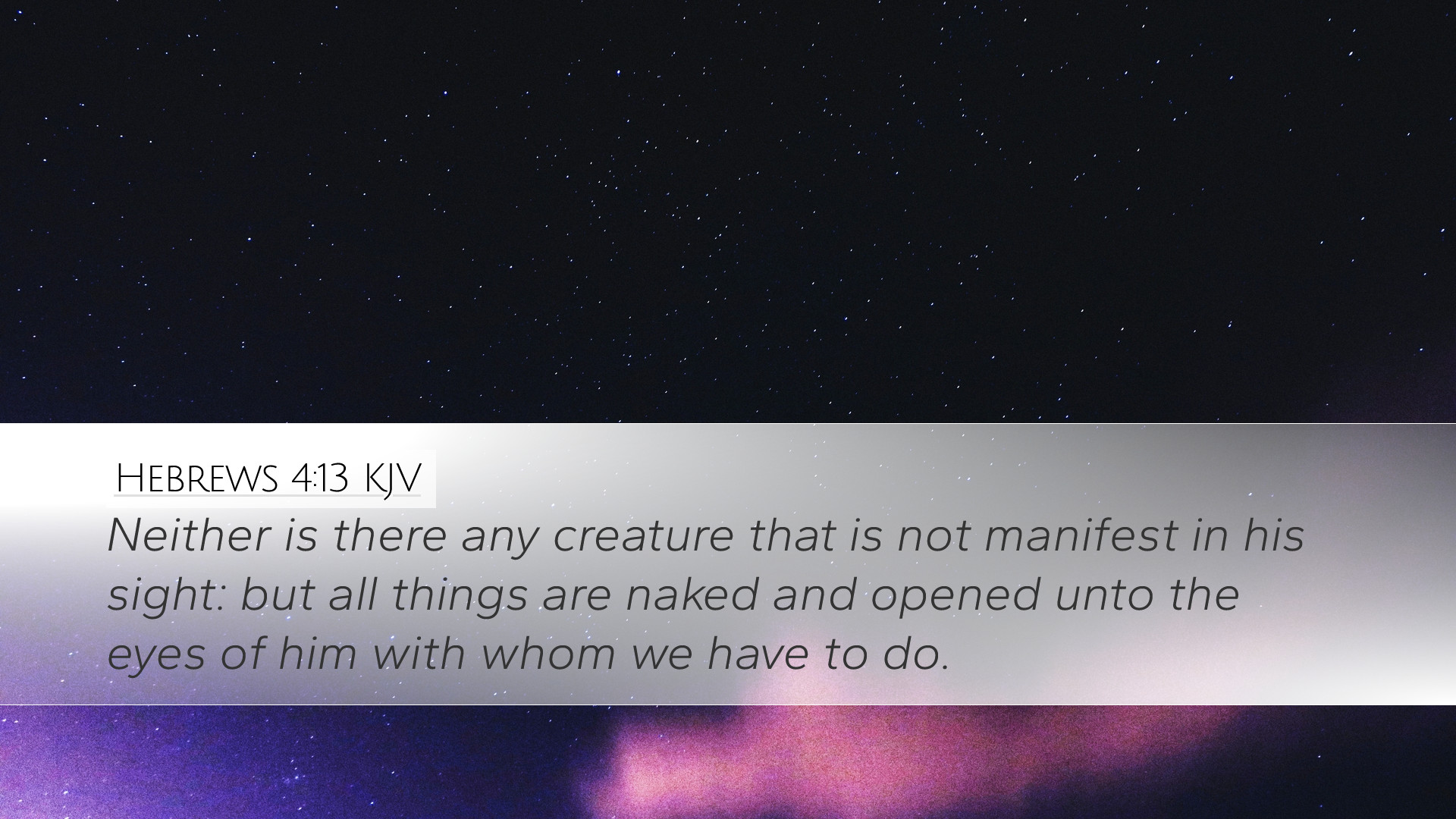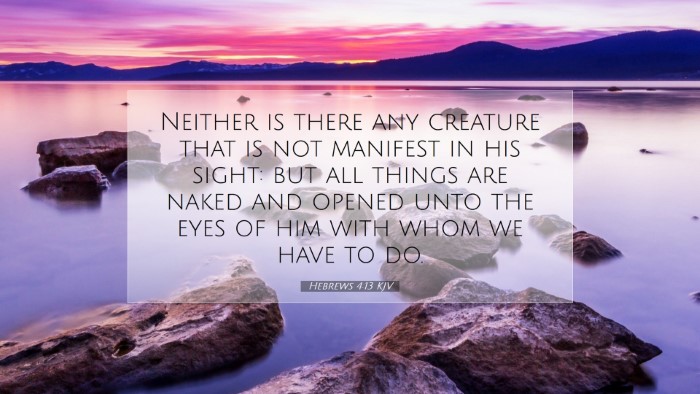Old Testament
Genesis Exodus Leviticus Numbers Deuteronomy Joshua Judges Ruth 1 Samuel 2 Samuel 1 Kings 2 Kings 1 Chronicles 2 Chronicles Ezra Nehemiah Esther Job Psalms Proverbs Ecclesiastes Song of Solomon Isaiah Jeremiah Lamentations Ezekiel Daniel Hosea Joel Amos Obadiah Jonah Micah Nahum Habakkuk Zephaniah Haggai Zechariah MalachiHebrews 4:13
Hebrews 4:13 KJV
Neither is there any creature that is not manifest in his sight: but all things are naked and opened unto the eyes of him with whom we have to do.
Hebrews 4:13 Bible Commentary
Hebrews 4:13 Commentary
Verse: "And no creature is hidden from his sight, but all are naked and exposed to the eyes of him to whom we must give account."
Introduction
This verse serves as a solemn reminder of God's omniscience and the ultimate accountability each individual has before Him. The profound truth contained in Hebrews 4:13 highlights the divine awareness of all our actions and thoughts, urging the reader to live in a manner that reflects this reality.
Contextual Overview
The Book of Hebrews was written primarily to encourage Jewish Christians facing persecution and to reaffirm the superiority of Christ. Chapter 4 specifically addresses the concept of entering God's rest through faith in Christ. The passage leading up to verse 13 discusses the rest promised by God and warns against unbelief, emphasizing the need for diligence in faith.
Commentary Insights
-
Matthew Henry:
Henry emphasizes God's omniscience as a central theme in this verse. He points out that no creature, regardless of how seemingly insignificant, can escape God's notice. This should invoke a healthy fear and reverence for the Almighty, compelling believers to keep their lives in alignment with His will.
-
Albert Barnes:
Barnes discusses the implications of being "naked" and "exposed." He interprets this metaphorically, suggesting that our inner thoughts and motivations are laid bare before God. This nudges the believer toward introspection and the need for honest self-assessment, acknowledging that we cannot hide our sin from God.
-
Adam Clarke:
Clarke provides a deep dive into the Greek terms used in this passage, particularly the word "exposed" (or "manifest"). He explains that this exposure refers not only to awareness but also to judicial accountability. Clarke stresses that all individuals will eventually face God's judgment, making this insight crucial for those seeking to live righteously.
Theological Implications
Hebrews 4:13 presents significant theological implications regarding God's nature and human accountability. It asserts that God's awareness is both comforting and terrifying; comforting to those who seek refuge in His grace, yet terrifying to those who persist in sinfulness.
-
Divine Omniscience:
The verse underscores God's omniscience. He sees all—nothing is hidden from His sight. This truth challenges the notion that individuals can live apart from God's examination.
-
Human Accountability:
The phrase "to whom we must give account" compels believers to recognize the responsibilities that come with faith. Every action and thought is subject to review, fostering a culture of accountability within the Christian community.
Practical Applications
As both pastors and laypersons grapple with this verse, several practical applications emerge:
-
Encouraging Integrity:
Recognizing that everything is exposed to God’s gaze can lead to a heightened commitment to live with integrity, aligning one’s actions with their professed beliefs.
-
Fostering Transparency in Relationships:
Encouraging openness in relationships and community life allows believers to acknowledge their vulnerabilities and weaknesses, fostering a culture of grace and restoration.
-
Promoting Accountability:
Setting up structures within church communities that promote accountability can help individuals remain steadfast in their faith journey, ensuring that they do not stray from the path God has laid out.
Conclusion
Hebrews 4:13 serves as a poignant reminder of God's omniscience and the accountability that every person holds. By understanding the depth of this verse, believers are encouraged to live in light of this truth, fostering a life characterized by integrity, transparency, and faithfulness. This passage calls the church to a higher standard, motivating pastors, students, and theologians alike to diligently pursue a life that resonates with the ultimate reality of divine scrutiny and grace.


